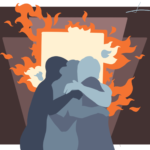Curious students who were unsure about their life’s direction while studying a behavioral science discipline found advice from leading professionals within the area at California Baptist University’s “Afternoon with Industry” event.
The School of Behavioral Sciences hosted the “Afternoon with Industry” event on Nov. 11 in the Copenbarger Presidential Dining Room. Students who replied to an electronic invitation were treated to a free buffet lunch and the opportunity to listen to a professional panel speak about their experiences within their fields of expertise.
“After graduation, there are three paths in front of you: marriage, graduate school and your career,” Stoke said at the event. “Our panel will discuss how to navigate the intersection.”
Perspectives discussed included industrial psychology, human resources, criminal justice, forensic psychology, counseling ministry and counseling psychology.
The event was moderated by Bruce Stokes, the dean of the School of Behavioral Sciences. The panel consisted of Linda Drake, the founder of the Dr. Linda P. Drake Foundation, Stephanie Newby, an officer within the Riverside County Probation Department. The panel also included Gary Collins, the associate dean of the School of Behavioral Sciences, Ana Gamez, assistant professor of psychology, Nathan Lewis, director of the counseling ministry graduate program and Mark Turney, adjunct professor of counseling psychology. Ken Pearce, professor of psychology, concluded the luncheon.
“I thought the event was very helpful, and I really enjoyed it,” Stephanie Doss, junior, said. “However, I did not think the entire field of Behavioral Science was represented. There was no one representing Sociology or Anthropology there.”
The panel was asked about how their occupation was influenced by their education, whether work experience or graduate school was more important and how their careers opened up the doors for witnessing to unbelievers.
The panel unanimously agreed that work experience is vital to a career and internships, regardless of subject, were important to gaining the experience. Networking, finding internships, volunteering and working were suggested for a great early start to a career.
“Be sensitive to situations where your faith can help a relationship,” Gamez said. “Use your gifts in your specialties.”
Students were encouraged to ask questions and follow up with the panel through e-mail due to a lack of time.
“Perhaps the most helpful question that the panel answered was, ‘What is more important: going to graduate school right away or getting experience?,’” Allison Beard, junior, said. “Mostly all of them said it is important to get involved and gain practical life experience. Graduate school is necessary for most behavioral science careers, but it is the real life experience and human interaction that will give us practical knowledge and get us acclimated to our field of interest.”
Beard added that the second most important question to her was how to share her faith in a secular work place.
“It is important to always be professional and treat everyone with dignity. And, although we may not be able to vocalize the gospel, we can always be examples in the way me interact with others and live our lives,” Beard said.
The speakers helped students when it came to getting into the industry but also with what they need to do when they leave the comforts of school.
“Be professional but stay true to what you believe and that will open doors to opportunities to share your faith,” Newby said.


